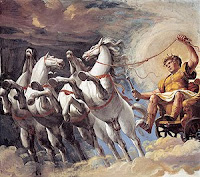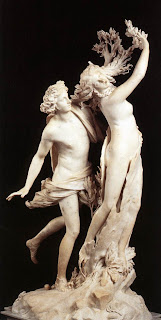
Apollo is the multi-talented Greek god of medicine, music and prophecy, intellectual pursuits, plague and sometimes the sun. Apollo was likewise a divine archer, associated with the care of herds and flocks, and the light (Phoebus, the bright) though not, as sometimes believed, with the sun.
He was the ever-youthful god, just and wise, and his counterpart can be found in the mythologies of Egypt and India in the figures of Horus and Rama. But he is for many he is the essentially Greek god, though in fact he was a late arrival among the Olympians.
Apollo himself represented a level of moral excellence and his cult at Delphi had enormous influence; it became the most venerated shrine in Greece and the Delphic oracle the supreme authority on matters of religion and statecraft.
His character as a pastoral god suggests that his true origins lay with the people who moved down into Greece during the Indo-European migrations: certainly his function as the god of the oracular shrine at Delphi was acknowledged by the Greeks as the result of a series of events and not as something which had always existed. Apollo’s role as the god of prophecy is very ancient and it is not known when the oracle actually became his. The persistent indications that he came into Greece with the migratory peoples are reinforced, in addition to the names already mentioned, by the epithet Lykeios, and by his connection with the Hyperboreans*
The story of his birth in Hesiod makes him the son of Zeus and Leto, daughter of the
 Titans Phoebe and Coeus. Leto became, inevitably, the victim of Hera’s spite, and no country would give Leto sanctuary to bear her children in case they incurred the wrath of the jealous goddess. Leto’s wanderings took her to the floating islands of Ortygia and Delos, which only became firmly fixed after the children were born. Artemis was the first, on Ortygia and soon after she was born she was able to help her mother across to Delos where Apollo was born, on the northern slopes of the hill of Cynthus.
Titans Phoebe and Coeus. Leto became, inevitably, the victim of Hera’s spite, and no country would give Leto sanctuary to bear her children in case they incurred the wrath of the jealous goddess. Leto’s wanderings took her to the floating islands of Ortygia and Delos, which only became firmly fixed after the children were born. Artemis was the first, on Ortygia and soon after she was born she was able to help her mother across to Delos where Apollo was born, on the northern slopes of the hill of Cynthus.Artemis, the twin sister of Apollo is the goddess of virwilderness and hunting. See picture
As sun god, Apollo was also called by the Latin word for sun, Sol
Apollo’s attributes/symbols
 Apollo is depicted as a beardless young man with curly golden hair (ephebe). His attributes are the tripod, omphalosi, lyre, bow and arrows, laurel, hawk, raven, swan, fawn, roe, snake, mouse, grasshopper and griffin.
Apollo is depicted as a beardless young man with curly golden hair (ephebe). His attributes are the tripod, omphalosi, lyre, bow and arrows, laurel, hawk, raven, swan, fawn, roe, snake, mouse, grasshopper and griffin.Also known as the sun god, Apollo was not initially so. In Homer, Apollo is the god of prophecy and plagues (as mentioned above). He is also a warrior in the Trojan War. Elsewhere, Apollo is also a god of healing, archery, agriculture and the arts - especially music (Apollo taught Orpheus to play the lyre). His arrows could send plagues, as happens in the Iliad Book 1.
Picture : Apollo with his lyre
APOLLO's ADVENTURES
Slaying of the Python

Apollo was a favoured child from the moment of his birth. He was fed on nectar and ambrosia by Themis, and this divine food brought him to manhood in the short time of four days, Then Hephaestus made arms for him- a bow and arrows and he was ready to assume his godhead. He went in pursuit of the serpent that Hera sent to torment his mother, Leto. He found the serpent on Mount Parnassus on the mainland to Greece, but Python, the serpent sought refuge at Delphi but Apollo followed it into the shrine of the Oracle of Mother Earth and killed him by the cleft in the earth from where the oracle spoke.
Gaia was of course
 furious with the defilement of her shrine. Zeus sent his son to the Vale of Tempe in Thessaly to undergo a ritual purification (in some versions Apollo’s servitude to mortal King Admetus was part of his penance, see below) and instituted the Pythian Games to commemorate Python-or Apollo’s victory over him.
furious with the defilement of her shrine. Zeus sent his son to the Vale of Tempe in Thessaly to undergo a ritual purification (in some versions Apollo’s servitude to mortal King Admetus was part of his penance, see below) and instituted the Pythian Games to commemorate Python-or Apollo’s victory over him.In any case, he took over the Oracle at Delphi and became associated with the art of prophecy since. The priestess through whom the oracle spoke became his servant. Almost seers soon claimed to have been either taught or fathered by him. Picture: Temple of Delphi
Apollo becomes a labourer
Apollo transmitted the power of healing to his son, Asclepius who exploited this ability to raise men from dead. Zeus punished him by striking him with a thunderbolt. Apollo retaliated by killing the Cyclopes who created the thunderbolt.
Zeus then punished Apollo by sentencing him to a year of servitude which he spent as herdsman for the mortal king Admetus.
Apollo in the Trojan War
The Trojan War was a pivotal event for the Greeks. Zeus’ attempts to maintain neutrality during the war but other gods and goddesses choose sides.
Apollo and his sister Artemis side with the Trojan in the Trojan War. In the first book of the Iliad, Apollo is angry with the Greeks for refusing to return the daughter of his priest, Chryses. Apollo showers the Greeks with arrows of plagues.
Apollo and the Laurel Wreath of Victory
Apollo slew the python, competed musically with another god, Pan and insulted another god of love (Eros/Amor/Cupid). As Cupid shot him with one of his special arrows, Apollo was fated to a disastrous and unrequited love. Daphne, the object of love metamorphosed into a laurel tree to avoid him. (see Relationships of Apollo)
Leaves from the laurel tree were thereafter used to crown victories at the Pythian games.
Apollo and the Sun

Apollo has many attributes but he was not originally the chariot-riding sun god Helios. Perhaps, the earliest reference to Apollo as the sun god Helios occurs in the surviving fragments of Euripides’ Phaethon was one of the chariot horses of the Homeric goddess of the dawn, Eos. It was also the name of the son of the sun god who foolishly drove his father’s sun-chariot and died for the privilege.
Picture: Apollo riding his chariot
APOLLO's RELATIONSHIPS
 Apollo mated with many women and a few men only. He was never married but fathered more than a dozen of children with nine different partners. It was never safe nor easy to resist his advances. He was though rejected by the seer Cassandra which made him punish her by making it impossible for people to believe her prophecies.
Apollo mated with many women and a few men only. He was never married but fathered more than a dozen of children with nine different partners. It was never safe nor easy to resist his advances. He was though rejected by the seer Cassandra which made him punish her by making it impossible for people to believe her prophecies.Apollo was most persistent in courting Daphne, a mountain nymph. He first eliminated his direct competitor, Leccipus, son of King of Oenamaus of Pisa. Leccipus disguised himself as a girl to be with Daphne when was revelling with the other nymphs in the mountains. The nymphs bathed naked- this was Apollo’s advice. Leccipus was exposed and torn to shreds by the nymphs.
Daphne still rejected Apollo and she eventually changed into a laurel tree to avoid him. Thereafter, Apollo made the laurel tree his scared plant.
He sired mostly males, including his son Asclepius.
Apollo and Daphne in picture on the left
Bibliography
http://ancienthistory.about.com/cs/grecoromanmyth1/p/Apollo.htm
http://www.in2greece.com/english/historymyth/mythology/names/apollo.htm
http://www.greek-mythology-gods.com/apollo.html
http://ancienthistory.about.com/od/apollomyth/ig/Apollo/Apollo.--24.htm
Image Source
Apollo 1st image
http://www.linsdomain.com/gods&goddesses/pictures/apollo.jpg
Apollo and his Lyre
http://www.apolloscabinet.com/images/apolloimages/apollo16.jpg
Artemis
http://en.wikipedia.org/wiki/File:Houdon-diana4.jpg
Apollo and the sun chariot
http://www.ausstellung-landshut.de/bilder/besucher/apoll_sonnenwagen.jpg
Apollo slaying the python
http://www.wilsonsalmanac.com/images1/apollo_python_goltzius.jpg
Temple of Delphi
http://z.about.com/d/ancienthistory/1/0/1/t/2/DelphiTempleApollo.jpg
Apollo and Daphne
http://www.lib-art.com/imgpainting/9/4/6949-apollo-and-daphne-gian-lorenzo-bernini.jpg
Apollo citaredo
http://img.freebase.com/api/trans/raw/wikipedia/images/commons_id/2442580
